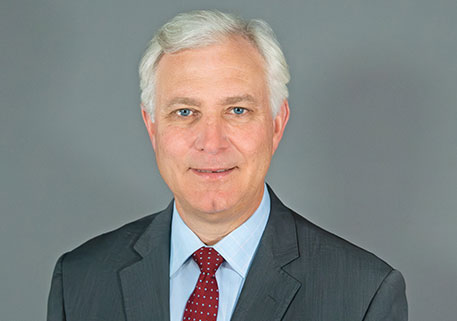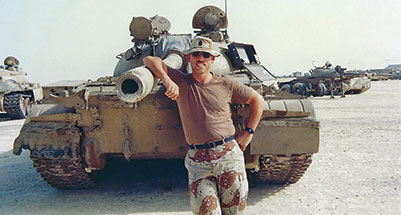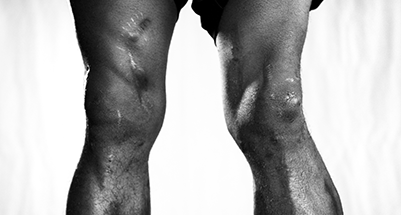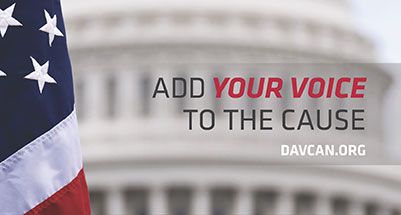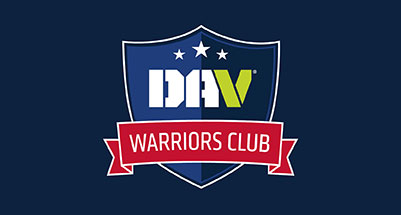
DAV benefits advocate calls on personal experience to help Vietnam veteran struggling with PTSD
From the moment he first stepped foot back on American soil, Dennis Eggers struggled with the aftermath of Vietnam. Recurring nightmares would wake him in the middle of the night, bringing with them memories of the horrors he lived through and other signs of post-traumatic stress disorder.
Eggers enlisted in the Marine Corps in 1966. After boot camp and radio operator training, he volunteered for Force Reconnaissance—a special operations entity known for performing unconventional warfare behind enemy lines. But in December 1967, he received orders to deploy to Vietnam as a replacement radioman with Company K, 3rd Battalion, 4th Marines.
Five months later, he was injured in combat while patrolling an area that had been the site of a battle the previous day.
“They had us pinned down, and we retaliated with everything we had,” recalled Eggers, “from mortars to recoilless rifles to airstrikes.”
The attacking force was thought to have been “taken care of” when mortars began to rain on the Marines’ position. Shrapnel peppered Eggers’ right side and lodged in his eye, blinding it instantly. Doctors were able to remove the small shards of a mortar shell, but infection set in, causing Eggers to ultimately lose the eye.
He was medically retired from the Marine Corps at the end of 1968.
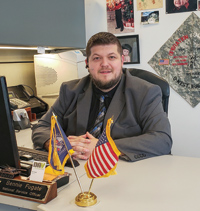
The nightmares, Eggers thought, were “just part of the deal.” For decades, he didn’t seek help for his mental or physical health, both of which required attention. But that changed in April 2018 when Eggers, then the commander of DAV Chapter 5 in Elmhurst, Ill., met National Service Officer Ben Fugate, an Army veteran who supervises the DAV Chicago National Service Office.
Fugate conducted an information seminar for the chapter, and following his presentation, he asked Eggers about his health and overall well-being. The two discussed possible exposure to Agent Orange before switching to the topic of PTSD.
Despite experiencing nightmares and anxiety in crowds as well as being easily startled, Eggers thought he didn’t have it, recalled Fugate.
That response was all too familiar for Fugate, who served in Iraq. He had the same outlook on his mental health when submitting his claims with the Department of Veterans Affairs. In 2008, Fugate was cruising along the streets of Mosul when a 1,000-pound roadside bomb hit his vehicle.
“I lost three guys right in front of me in that explosion,” said Fugate.
Six months after being honorably discharged, Fugate decided it was time to apply for VA benefits, and his wife encouraged him to seek care for his mental health.
“We sat down to fill out the paperwork, and she said I needed to include PTSD,” he said.
Fugate initially resisted but then reluctantly agreed. He told VA physicians, however, that he didn’t have it. But when a VA doctor pressed Fugate with the same questions he would later ask Eggers, the picture became much clearer.
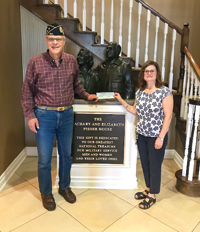
“I had to take a step back,” said Eggers. “I had just gotten out of the military, been through several jobs and had angry outbursts.”
He was diagnosed with PTSD and received treatment.
Fugate stresses he was able to assist Eggers because he was once in the same position. But securing the VA benefits for Eggers unfortunately proved to be another battle. In September 2018, the VA approved Eggers’ claim for heart disease, likely due to Agent Orange exposure, but denied that he had PTSD.
“I took it personally,” Fugate added. “This is not right.”
Following the denial, Eggers attended VA compensation and pension exams and started seeing a mental health professional. The VA deferred its decision over Eggers’ PTSD several times in 2018 before issuing its final decision in May 2019, which came back favorably. Eggers’ rating was increased for combat wounds in his back and spine, and he was granted service connection for PTSD.
When Fugate called Eggers to tell him the good news, both men became emotional.
“It was something special,” said Fugate. “You could hear the tears in his voice and how excited and thankful he was.”
The recurring nightmare Eggers had been living with is, at times, still with him, but he said it is different now that he received mental health treatment.
“Before, the dream would have no ending. I would wake up and my heart would be racing because I thought I was back in Vietnam,” he explained. “Now, the dream has an ending, and I’m able to deal with it better.
“I would not have sought out help at the VA if Ben hadn’t pushed me,” he added. “He said, ‘Dennis, I know where you’re at. I’ve been there, and I’m telling you help is available, and here’s where to start.’”

